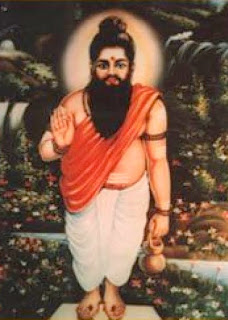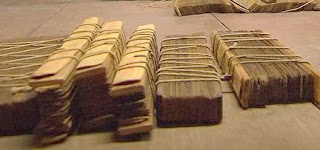Your life-long diary had been written 4000 years ago by someone else!
By h e m a n t h - September 29, 2010
Many of my friends have asked me to write more about Naadi astrology and my own experience with it. Right at the outset, I have to acknowledge that I’ve been an outright skeptic of all forms of astrology prevailing in the world. Almost all forms of astrology practised in the world (like Hindu astrology, Western astrology and Chinese astrology) are based on the relative positions of celestial bodies. But interestingly, Naadi astrology differs from this. It is more of an ‘occult prediction’ recorded on palm leaves supposedly 4000 years ago, for the future human generations on earth. But did Naadi change my perceptions on astrology? What did it do to me? Did it succeed, or fail to prove itself? We’ll see all that in my next post! Before that, let me unravel the mystic and the most interesting Naadi astrology..
Naadi astrology (Naadi jyothidam) has been practised in the state of Tamil Nadu, India, for thousands of years. These were written by ancient Tamil sages called ‘Siththars’. The most famous Siththar of all was Agathiyar. He had written Naadi predictions for almost all human beings in the world- for all generations, including our future generations! These had been taken copies of by several generations, and what we have today are palm leaf manuscripts in Tamil vatteluththu script (though a significant proportion has been lost in time). Anyone who seeks Naadi astrology is taken an impression of their thumb (left for females, right for males). Each unique thumbprint forms an index with which the corresponding set of palm leaves can be identified. These palm leaves can be read out by anyone who knows to read Tamil vatteluthu script (as opposed to only astrologers rendering predictions with the other forms). Nothing other than a thumbprint is required.
The palm leaf manuscript starts with a hymn that praises Lord Shiva, and goes on to say what your name is, what your father’s and mother's names are, when you were born, how many siblings you have, what is your current profession, and goes until it reveals your future life up until death. (Ashtonishing, isn’t it? But how valid is this? We'll see this in my next post!) Well, this is just the basic chapter, which tells an overview of one’s life. There are 11 more chapters which go into detailed predictions about one’s mother, father, siblings, marriage, future spouse (s) and children, relationships, health, diseases, wealth, accidents, rituals that can dilute past bad deeds, business, longevity, etc. Phew.. And not just that- there are also two chapters that talk about your previous birth and where you will be born in your next birth on earth! Creepy enough.
Well, Agathiyar did not write only Naadi astrology, and he is not the only siththar. There were 18 siththars who are considered to be the primary ones. Some of them are Agathiyar, Thirumoolar, Korakkar and Bogar. Each siththar had 8 great powers (siththis) such as Anima (to become as tiny as an atom), Mahima (to become big in unshakeable proportions), Laghima (to become as light as vapour in levitation, Prapti (to enter into other bodies in transmigration). Agathiyar is also said to have lived for 1000 years (Can't take it? Well, the biblical Noah lived for 950 years according to the Old Testament of Bible. Very ancient history is beyond proofs. We’d rather not waste time in pondering if it’s pseudoscience or not). Besides naadi astrology, the other contributions of these ancient Tamil siththars were writings on: Alchemy, Siddha medicine (using herbs), Tamil grammar and Tantra which were in humongous volumes each (here, it’s superfluous to mention about the ancient Tamil literature’s vastness).
 |
| Agathiyar Siththar |
And finally, why is it called Naadi?! Naadi means ‘to seek’ in Tamil. It essentially means that you will seek Naadi astrology only when you are destined to do so- on the destined date - which would be mentioned in the first few lines of one's Naadi palm leaf!
I mentioned in one of my previous posts encouraging everyone to write and record their life in their diary. Well, perhaps I should take my word back. Why write one if a Siththar had written yours already 4000 years ago?!









